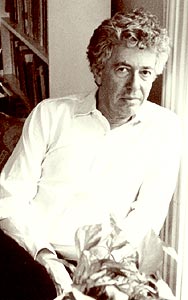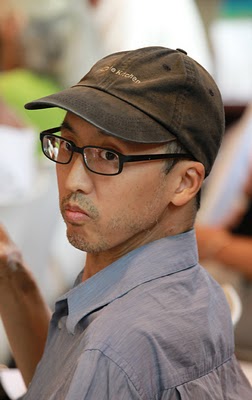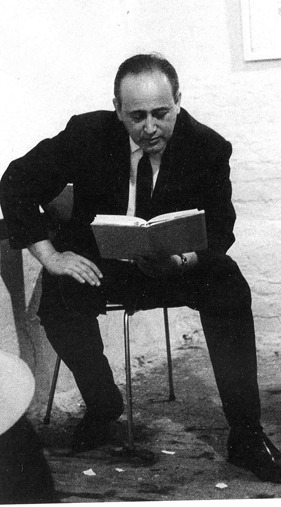As some J's Theater readers may know, in my capacity as the Harriet_Poetry tweeter (twitterer sounds a bit flightier), I have been nightly posting poetic forms for people seeking a short National Poetry Writing Month (#NaPoWriMo) writing project. The goal is a poem a day, so that by the end of the month, you'll have 30 drafts. The forms and genres each day I've suggested have been as follow: nocturne (April 1), sestina (April 2), senryu (April 3), mesostic (April 4), ekphrastic poem (April 5), biopoem (April 6), palinode (April 7), cento (April 8), bop (April 9), alphabet/abecederian poem (April 10), ghazal (April 11), concrete poem (April 12), triolet (April 13), gigan (April 14), limerick (April 15), acrostic (April 16), villanelle (April 17), tanka (April 18), blues stanza (April 19), sapphics (April 20), pantoum (April 21), S+7/N+7 (April 22), haibun (April 23), erasure poem (April 24), sonnet (April 25), rhyme royal (April 26), and the clerihew (April 27). Tonight's form was the seguidilla (April 28!).
Some of these forms (sonnets, villanelles, ghazals, N+7, etc.) are quite common in contemporary American poetry, others, like the rhyme royal or mesostic are rare, and others, like tanka and sapphics, have their diehard adherents. Most surprising are the forms like the erasure poem that provoked eager responses, attempts, and links; another very popular was has been last night's entry, the clerihew. I won't reprise my tweet-length intro to this light form--and I've wanted to include lighter forms as well as those, like the ghazal or blues stanza, that often treat serious themes--except to say that it's named after its founder, Edmund Clerihew Bentley (1875-1956) a British poet, novelist and humorist of the late 19th and early 20th century, who invented the "clerihew," a four-line poem of (necessarily) irregular meter, with a simple rhyme AA-BB. Clerihews are supposed to be witty, droll, sarcastic, silly, but with some level, however minimal, of humor. I needed a bit of humor today as I waited for the repair people at Meinecke to rebuild my car's break system (as well as something called a "control panel" that was in very bad shape), to the tune of...well, let's not get into that. As I sat I found myself returning to this simple form, and once I got into I penned the ones below, all about political figures. Some aren't so humorous, some are, but I think a few are a bit catchy. (Someone get the one about Michelle Bachmann or Newt Gingrich into the mainstream media....) I've even thrown in the leaders of our two closest neighbors, for good measure.
Anyways, enjoy, and if you're feeling that bit of dyspepsia before having to fork over a lot of money for anything, write a few clerihews. They're more charming than limericks, I think, and light, but with a bite.
CLERIHEWS (All by yours truly)
Is Bill ClintonSome of these forms (sonnets, villanelles, ghazals, N+7, etc.) are quite common in contemporary American poetry, others, like the rhyme royal or mesostic are rare, and others, like tanka and sapphics, have their diehard adherents. Most surprising are the forms like the erasure poem that provoked eager responses, attempts, and links; another very popular was has been last night's entry, the clerihew. I won't reprise my tweet-length intro to this light form--and I've wanted to include lighter forms as well as those, like the ghazal or blues stanza, that often treat serious themes--except to say that it's named after its founder, Edmund Clerihew Bentley (1875-1956) a British poet, novelist and humorist of the late 19th and early 20th century, who invented the "clerihew," a four-line poem of (necessarily) irregular meter, with a simple rhyme AA-BB. Clerihews are supposed to be witty, droll, sarcastic, silly, but with some level, however minimal, of humor. I needed a bit of humor today as I waited for the repair people at Meinecke to rebuild my car's break system (as well as something called a "control panel" that was in very bad shape), to the tune of...well, let's not get into that. As I sat I found myself returning to this simple form, and once I got into I penned the ones below, all about political figures. Some aren't so humorous, some are, but I think a few are a bit catchy. (Someone get the one about Michelle Bachmann or Newt Gingrich into the mainstream media....) I've even thrown in the leaders of our two closest neighbors, for good measure.
Anyways, enjoy, and if you're feeling that bit of dyspepsia before having to fork over a lot of money for anything, write a few clerihews. They're more charming than limericks, I think, and light, but with a bite.
CLERIHEWS (All by yours truly)
still resenting
that the star of the national drama
is not Hillary but Barack Obama?
Only voluble Joe Biden
decides when
he's going to stay quiet
or open his mouth and provoke a media riot.
Mitt Romney
takes an omni
approach to every issue; one minute
he's against it before he's for it before he's against it.
Al Franken
has been cranking
up more critiques and votes than guffaws
since going to DC to make not jokes but laws.
Florida's Allen West
has managed to wrest
the title of "Craziest Brother" in DC
from the current holder, SCOTUS's Clarence T.
Michelle Bachmann
took one
or twenty bad ideas, born out of ignorance and fear
and turned them into a rising career.
Illinois's Dick Durbin
is perturbing
because it's clear that all the GOP has to do is deliver
a stern look to make him quake and quiver.
Paul Wolfowitz
spits on his comb then splits
whenever anyone presses him as to why
he told those tall tales that caused so many to die.
Donald Rumsfeld
unlike the old Rust Belt
is an entity for which no one yearns
and will do their darnedest to ensure never returns.
Donald Trump
seeks to jump
into the race to be president,
but needs to first find where his soul and sanity went.
Mike Huckabee
how lucky he
finds himself in a GOP field that's changed
to mostly liars, hucksters, and the certifiably deranged.
Rand Paul
would presumably crawl
over broken glass, through fire rings, and a maze of ice
to reach his libertarian paradise.
Paul Ryan
is dying
to impose his extreme plan
which he copied from the fantasy books of Ayn Rand.
Haley Barbour
might harbor
some tall tales about his alma mater Ole Miss
that would make quite a few historians start to hiss.
Rick Santorum
adore him
they didn't in the Keystone State
because of his frequent, frothy tide of hate.
Ex-Gov Sarah Palin
is steadily sailing
into a sea of ignominy
and growing richer fast as 1-2-3.
President Barack Obama
again proved that his mama
in a Hawai'i hospital had done
what was required to register his US birth in 1961.
When will George W. Bush
start to push
to find WMDs hidden near his palace
in Dallas?
Newt Gingrich
has an itch
not to sit in the Oval Office with his finger on the nuclear button
but to have cameras endlessly covering him saying nothing.
Harry Reid
has no need
to do much more than widely share
that the GOP aims to murder Medicare.
Scott Walker's
a talker
who likes to claim his state is broke,
except when warbling valentines to a fake Koch.
Governor Jan Brewer
once would skewer
any reasonable appeal or bill, which she rejected,
but has changed her tune a bit since she was elected.
Nancy Pelosi
has become ghostly
to the media, who barely remember
how effective she was right up till last November.
Dick Cheney
remains the
only man elected to the second slot
who outdid his boss in the horrors he wrought.
Sonia Sotomayor
will not cry for
the departure of her colleagues on the (far) right,
whether they leave yesterday, today, or tomorrow night.
France, tu l'aimes, Nicolas Sarkozy,
or does he
still raise your hackles
as when lightning crackles?
Prime Minister David Cameron
won
by saying he would not cut
all the things he's since tried to gut.
Daily Nick Clegg
will beg
voters to recall
nothing he promised before he took office last fall.
Felipe Calderón
might want to own
a mansion on this side of the border
since he's leaving his country in worsening disorder.
Steven Harper
appears sharper
than his opponents might have tallied.
They've slain the government but he's swiftly rallied.
Copyright © John Keene, 2011.





























